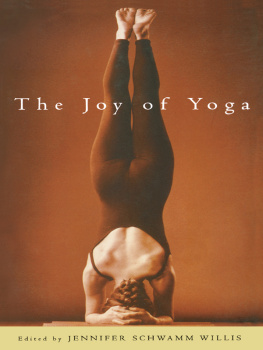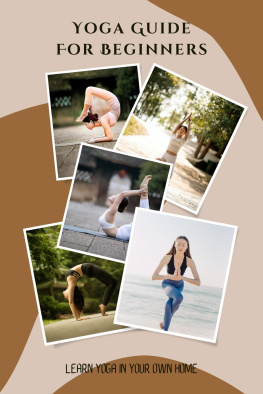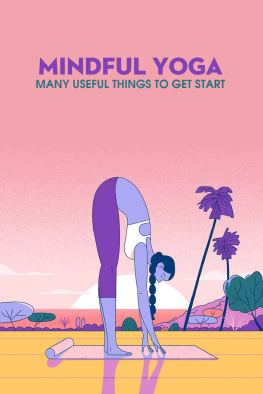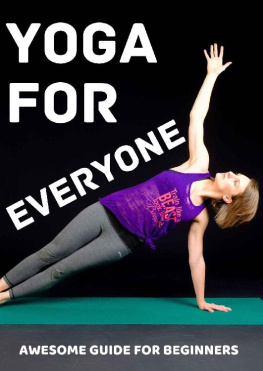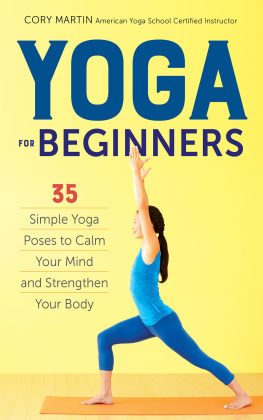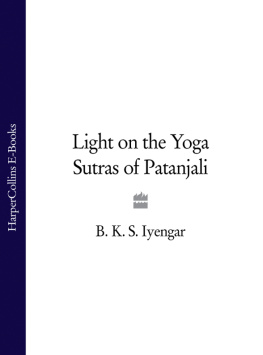All rights reserved. No part of this book may be reproduced in any form without prior written permission from the publishers and the copyright owner, except by reviewers who wish to quote brief passages.
The joy of yoga: how yoga can revitalize your body and spirit and change the way you live / edited by Jennifer Schwamm Willis.
p.cm.
ISBN: 978-1-56924-572-9
eBook ISBN: 9780786747719
1. Yoga, Hatha. I. Willis, Jennifer Schwamm.
For my body, which spoke to me with love until I learned to listen.
For Colquitt Meacham, who created a safe place for me to begin my journey home.
For Erich Schiffmann, who is teaching me to surf.
Introduction
I was about 10 years old when I left home. I didnt pack a bag or break open my pink glass piggy bank. I didnt leave my family or the apartment where we lived. My mind, posing as my best friend, led me astray with its loud voice, quick wit and promises of knowledge. I stopped listening to my body. I became anxious and fearful. I was seldom joyful.
I was away from home for a long time, apart from occasional visits. I might be speeding down a ski slope, looking out of a window at the lights of a great city, riding a horse in the mountains or running down a quiet road, and there I would behome again, briefly.
Ten years ago at the age of 35 I stepped into a studio and onto a yoga mat. I wasnt sure why I wanted to do yoga, but I knew I was looking for something. Being athletic I didnt have much trouble getting my body into the postures. But small things would throw me. I was from time to time confronted with parts of my body that previously were unknown to me. I could not move them; they remained unresponsive to my will. Occasionally my mind would overpower my body, forcing movementthen my body would experience pain.
It took me several years to begin to see what was happening. I was so completely identified with my mind that my body had become a stranger, something I needed to control, something I had to placate, something I had to keep in shapeit wasnt really me.
One morning during a yoga class not so long ago I realized that I was home. I keep a journal of my yoga experiences, and this is what I wrote:
I had another insight during class. It seems so obvious as to be ridiculous: I am my body and my body is me. There is no difference. Any separation of the two is entirely artificial and simply a denial of what really is. If I am kind to my body, I am kind to myself. If my body is flexible, I am flexible. It doesnt even make sense to refer to ones body as something other than ones self. When I say I I mean all of me. I dont think Ive ever really lived that truth before.
A teacher once quoted the great yogi B.K.S. Iyengar to the effect that the mind is in every cell of your body at the same momentthat it is your bodyand that one of the aims of the yoga postures is to experience this and to know it. This was a seductive and compelling proposition to me, but I had never really felt its truth until this morning.
It follows from this truth that it isnt possible to disappear from your bodyto absent oneself during painful or difficult situations nor during joyful ones. Your bodynot just your mindexperiences suffering or joy in such situations, and it is only a trick of the mind which allows you to believe otherwise. And the suffering and joy of your body are as real and as important as the suffering and joy in your mindmaybe more so.
We do a great injustice to ourselves when we deny our body the right to those experiences and those memoriesif we do, we can never heal, and we can never come home. To disrespect our bodies is to disrespect ourselves. To turn a deaf ear to the quiet yet steady whisperings of our bodies is to refuse wisdom.
Yoga is often translated as union, the union of body, mind and spirit. Patanjali was a sage credited with writing the Yoga Sutrasa collection of aphorisms that comprise the fundamental teachings of yogaduring the second century B.C.E. He said that the aim of yoga is to quiet the fluctuations of the mind, to create stillness in order to hear ones inner voice, and ultimately to discover that ones inner voice is the voice of all being.
Any pursuit of truth is a spiritual endeavor. Yoga is one way to still the mind and experience reality, the joy of livingto simply be. All that we need is within us. If we listen to the directions, we will find our way home. And when we do, it will be a joyful reunion.
The mind believes. The soul knows. Yoga is teaching me to know. Yoga is an ancient spiritual practice. Scholars have spent lifetimes studying its forms and meditating on its meaning and power. This book doesnt aim to give a comprehensive overview of yoga, but rather to offer a sense of the vastness and depth of yoga and its possibilities as a transformational practice. There are many roads home.
Namaste.
Jennifer Schwamm Willis
moving into stillness
BY ERICH SCHIFFMANN
American yoga master Erich Schiffmann, author of Yoga: The Spirit and Practice of Moving into Stillness, combines hatha yoga and meditation into a cohesive practice. The purpose of yoga, writes Schiffmann, is to facilitate the profound inner relaxation that accompanies fearlessness. The release of fearlessness is what finally precipitates the full flowering of love. Here he is interviewed by author, teacher and healer Dr. Jim Dreaver.
Q :Would you briefly explain your approach to yoga and what it is you want your students to get from their physical practice?
I use the discipline of yoga to encourage the experience of stillness. The feeling of stillness is peace, and the feeling of peace is joy. Thats simple and profound and exciting.
This is my emphasis because this is the most direct way of experiencing the truth about yourself. Experiencing yourself in stillness is like a wave relaxing into itself and thereby experiencing its inherent ocean nature. Instead of being swallowed up by the ocean and losing its identity, losing its waveness, like what you might imagine would happen, the wave continues to exist but its sense of identity expands. It now exists with the new realization that it is not what it thought it was. It is not a tiny specific wave only. It is the entire ocean in specific expression. It is expansive and specific at the same time. And that can be a big surprise.
The wave will experience its ocean nature when it relaxes into itself sufficiently to experience the depths of what it actually is. In a similar fashion, the way for you or me to find out what God is, what Consciousness is, or what the universe is and how it works, is by consciously relaxing into ourselvesthereby experiencing whats really so. If you want to know for sure what God or Consciousness is, then you must experience yourself consciously. You must consciously experience what it means to be conscious. Knowing is not intellectual or conceptual. It is the result of direct experience.

